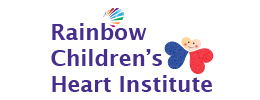Your child’s pulse or heart rate may vary greatly over the course of a day. Pulse is nothing but the number of heart beats per minute. Heart rate can be slow or fast depending on day-to-day activities. It fluctuates from a rapid rate while exercising to a slow and steady beat while sleeping or resting.
The normal heart rate can vary widely depending on how old your child is. It also differs from the biological factors of each child. The resting heart rates can be different even for kids of the same age. You can consult the best child cardiologist in India or the cardiac experts at Rainbow Children’s Heart Institute to know what should be considered a normal heart rate specifically for your kid.
Healthy heart rates for children of different age group
Resting heart rate is the heart rate of a child when he/she sits quietly. A normal resting heart rate tends to vary according to the age of children.
- 70-190 heartbeats per minute can be considered healthy for newborns (0-1 months old)
- 80-160 heartbeats minute is a healthy range for infants (1-11 months old)
- 80-130 heartbeats per minute is considered healthy for children aged 1-2 years
- 80-120 heartbeats per minute is considered healthy for children aged 3-4 years
- 75-115 heartbeats per minute is considered healthy for children aged 5-6 years
- 70-110 heartbeats per minute is considered healthy for children aged 7-9 years
- 60-1000 heartbeats per minute is considered healthy for children older than 10 years
Your child’s heart rate is likely to stay within these ranges, even if you feel the pulse is very rapid. Knowing how to check the pulse of your child and understanding that there can be variations helps keep track and avoid any possible concerns.
What factors affect the heart rate of a child?
As is the case with adults, the heart rate of children also varies based on the level of activity, whether they are awake or asleep, or whether they are stressed or calm, healthy or sick. Typically, the heart rate of a child is not an indicator of an underlying heart problem. The heart rate of children can become rapid because of anything that makes them uncomfortable or excited. The rise of heart rate is their natural stress response. Children can have a faster heart rate when they:
- Play or exercise vigorously
- Feel stressed or anxious
- Experience pain
- Suffer from illness or fever
- Drink too much energy drinks or caffeine
- Are dehydrated.
In each of the above cases, if your child has a rapid heart rate, it is usually nothing to worry about. However, excessive caffeine intake can cause issues. You also have to remember that the heart of a child beats faster as compared to the heart of an adult. So, it is no need to be alarmed if their heart rate is much faster while exercising than an adult heart rate.
Having said that, if your child does experience other symptoms such as trouble breathing or chest pain that is accompanied by a rapid heart rate, there might be a need for medical attention. In general, if the pulse of your child is too fast for you to count, you may have to visit Rainbow Children’s Heart Institute, the top heart specialist hospital in Hyderabad.
Typically, the heart rate of a child is slow when he/she is sleeping. However, medical assistance might be required if they have a slow heart rate in the middle of the day and experience fainting or show lethargy symptoms.
How to check the heart rate of your child?
It is simple to measure the pulse of your child. There are multiple places on the body where the pulse can be checked, including the side of the neck, inside the elbow, and the wrist. The wrist would be the easiest and most accessible place for most parents. For checking the heart rate of your child, you need to place your fingers on their wrist and apply pressure gently until you start feeling the pulse against your fingertips. You can count the beats for 15 seconds. The heart rate (beats per minute) of your child would be 4 times that number. Finding the pulse in infants and younger children is harder and you might need the help of a medical professional to take the pulse of your child.
